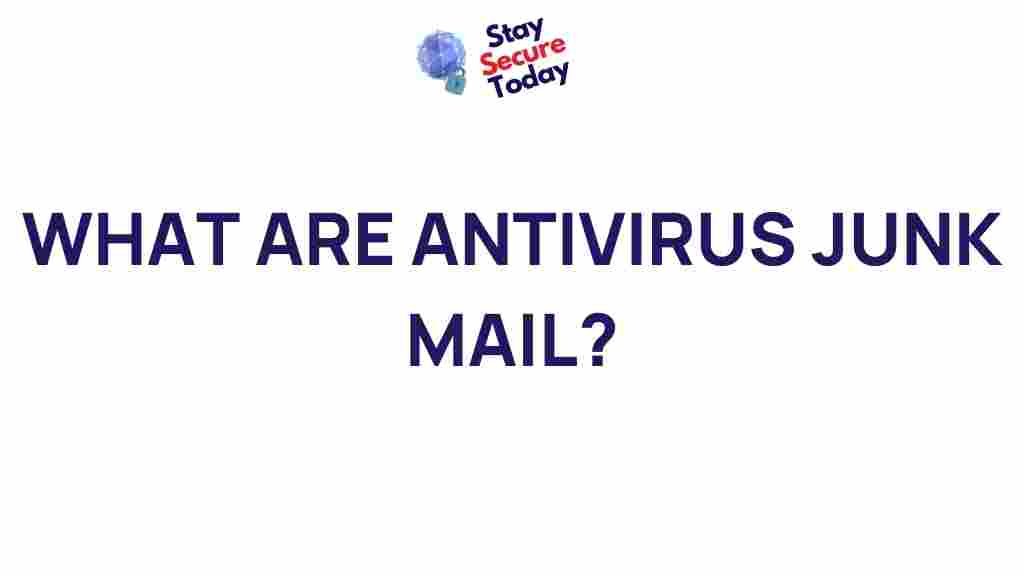Uncovering the Mystery of Antivirus Junk Mail
In today’s digital world, cybersecurity is more important than ever. One common problem users encounter is receiving junk mail from antivirus software. Although these emails are intended to provide important updates, promotions, or notifications about security issues, many times they end up in your inbox as unwanted messages. This article will explore the mystery of antivirus junk mail, how to manage it, and what steps you can take to ensure that your inbox remains free from clutter.
What is Antivirus Junk Mail?
Antivirus junk mail refers to unsolicited emails that are often sent by antivirus software vendors. These emails typically contain advertisements, product promotions, software updates, or other communications from the antivirus company. While some of these emails may be helpful, others can feel like spam. The problem is that they may not always be easy to distinguish from legitimate messages about system security.
These junk emails often include:
- Updates and reminders about subscription renewals
- Promotional offers and discounts
- Notifications of detected threats or issues
- Newsletters with tips on improving security
Why Does Antivirus Junk Mail Appear in Your Inbox?
Antivirus junk mail can appear in your inbox for a variety of reasons. The most common causes are:
- Marketing Strategies: Antivirus companies rely on email marketing campaigns to reach existing customers and promote their products. These promotional emails may seem like spam, but they are part of the vendor’s business strategy.
- Subscription and Renewal Notifications: Some antivirus software providers send automatic reminders about subscription renewals or product upgrades, which may not always be relevant or desired by the user.
- Frequent Updates: Antivirus programs regularly update to provide better protection. These updates may trigger automatic email notifications, which can be seen as annoying or unnecessary.
- Third-Party Marketing Partnerships: In some cases, antivirus vendors may share email addresses with third-party companies for promotional purposes. This can lead to more unsolicited emails flooding your inbox.
How to Manage Antivirus Junk Mail
If you’re overwhelmed by antivirus junk mail, there are several ways to manage and reduce the frequency of these emails:
1. Adjust Email Preferences
Most antivirus software allows users to customize their email preferences. By visiting your antivirus provider’s settings page, you can opt-out of receiving promotional or non-essential emails. Look for options such as “marketing communications” or “subscription notifications” to uncheck or modify.
2. Mark Emails as Spam
If antivirus junk mail continues to flood your inbox, mark these emails as spam in your email client. This helps your email provider filter out similar messages in the future. Over time, your inbox should become cleaner and more manageable.
3. Use a Separate Email Address for Registrations
Consider creating a dedicated email address solely for online registrations, including antivirus software signups. This way, any promotional or service-related emails from antivirus providers won’t clutter your primary inbox.
4. Unsubscribe from Unwanted Emails
Nearly all promotional emails contain an unsubscribe link. When you no longer want to receive emails from a specific antivirus provider, click the unsubscribe link to stop receiving future messages.
Troubleshooting Antivirus Junk Mail Issues
If the above methods don’t seem to work or you’re still receiving an overwhelming amount of junk mail from your antivirus, follow these troubleshooting steps:
1. Check Your Antivirus Software Settings
Many antivirus programs come with their own set of email notification settings. If you’re receiving too many notifications, dive into the software’s settings menu. Disable any unnecessary alerts or emails about product updates, promotions, or security issues.
2. Examine Your Email Filtering Settings
If you have set up filters in your email client, make sure they are not incorrectly classifying antivirus emails as important or legitimate messages. Adjust the filtering rules to ensure that junk mail from antivirus providers is automatically moved to the spam folder.
3. Contact Customer Support
If you continue to experience issues with excessive antivirus junk mail, it may be time to contact the customer support team of your antivirus provider. They may be able to manually adjust your email preferences or help you unsubscribe from unwanted communications.
Should You Uninstall Your Antivirus Software?
Some users may feel so frustrated with antivirus junk mail that they consider uninstalling their antivirus software altogether. While it’s understandable to want to avoid unwanted emails, it’s important to remember that antivirus software is a vital tool for protecting your devices from malware, viruses, and other online threats. Uninstalling it could leave your devices vulnerable to cyber-attacks.
Instead of uninstalling your antivirus software, try one of the methods outlined above to manage your email preferences and keep your inbox free of clutter. If the junk mail is too overwhelming, you might consider switching to a different antivirus provider with better email management features.
Conclusion: Staying Safe While Managing Antivirus Junk Mail
Antivirus junk mail is a common issue faced by many users, but it’s important to address it in a way that doesn’t compromise your digital security. By adjusting email preferences, marking emails as spam, and using dedicated email addresses for registrations, you can significantly reduce the volume of unwanted emails in your inbox.
If you’re still struggling with unwanted antivirus-related emails, don’t hesitate to contact the support team of your antivirus provider for assistance. Most importantly, remember that maintaining antivirus software on your devices is crucial for safeguarding your information and protecting against evolving cyber threats.
Need help finding the best antivirus software for your needs? Check out this comprehensive guide on choosing the right antivirus software.
For more information on staying safe online and preventing junk mail, visit this cybersecurity blog.
This article is in the category News and created by StaySecureToday Team
